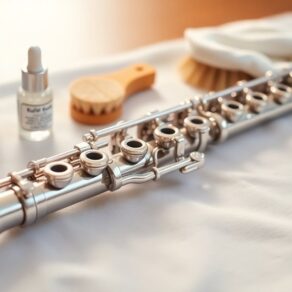To maintain your instrument effectively, start with a regular cleaning routine using the right tools and solutions tailored for your instrument type. Inspect pads and corks regularly for signs of wear, ensuring airtight seals. Monitor key mechanisms monthly, lubricating them every three months to prevent sluggish movement. Schedule professional servicing at least annually for deeper inspections. Keep a detailed maintenance log to track repairs and cleaning schedules. Finally, store your instrument properly in a quality case to protect it from environmental damage. Following these guidelines will optimize performance, and more insights await you on best practices.
Key Takeaways
- Establish a regular cleaning routine, adapting frequency based on usage, to maintain sound quality and extend your instrument's life.
- Inspect pads and corks regularly for wear, ensuring airtight seals and addressing any signs of damage promptly.
- Schedule professional servicing annually, or every six months for heavy users, to ensure optimal performance and address potential issues.
- Maintain a detailed maintenance log to track cleaning schedules, repairs, and environmental conditions impacting your instrument's care.
- Store your instrument in a high-quality case, controlling humidity and temperature to prevent damage and ensure long-term preservation.
Establish a Regular Cleaning Routine
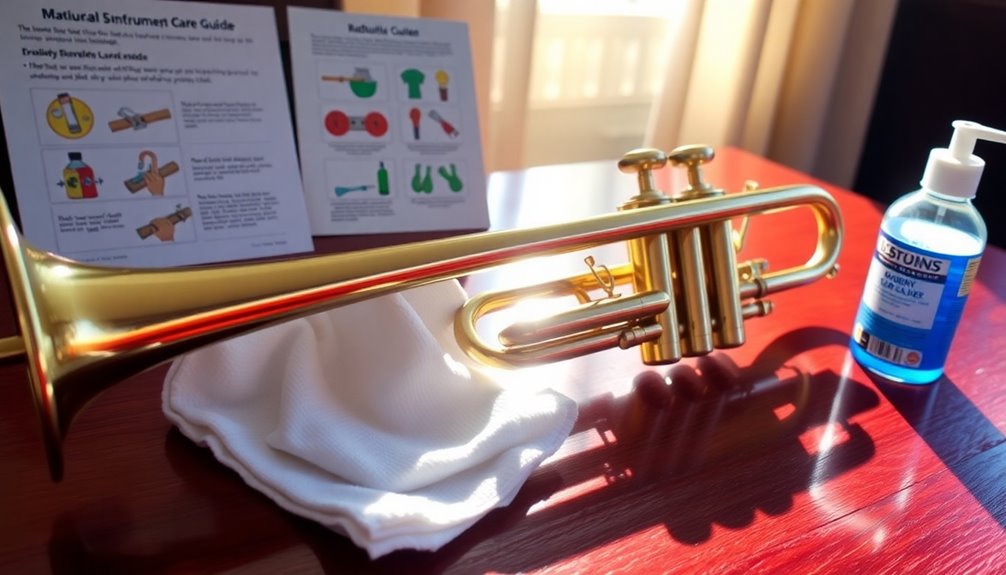
To guarantee your instruments perform at their best, establishing a regular cleaning routine is fundamental. This routine isn't just about aesthetics; it's essential for maintaining sound quality and extending the life of your instrument.
Start by determining the appropriate cleaning frequency based on your usage. For heavy users, a weekly cleaning schedule is ideal, while occasional players might consider a bi-weekly or monthly routine.
Choosing the right cleaning solutions is important. Always opt for products specifically designed for your instrument type, as they effectively remove dirt and oils without damaging the finish.
For brass instruments, use a mild soap and warm water solution to avoid corrosion. Woodwind players should consider specialized woodwind swabs and pads to prevent moisture buildup.
When cleaning, pay attention to details. Wipe down the exterior with a microfiber cloth to remove fingerprints and grime.
For brass, utilize a cleaning snake to clear any obstructions in tubing, as residue can drastically affect tone quality. Regular cleaning practices maintain peak performance and can significantly enhance your instrument's overall playability.
Don't forget to clean mouthpieces regularly, as they harbor bacteria that can impede your performance and overall health.
Inspect Pads and Corks
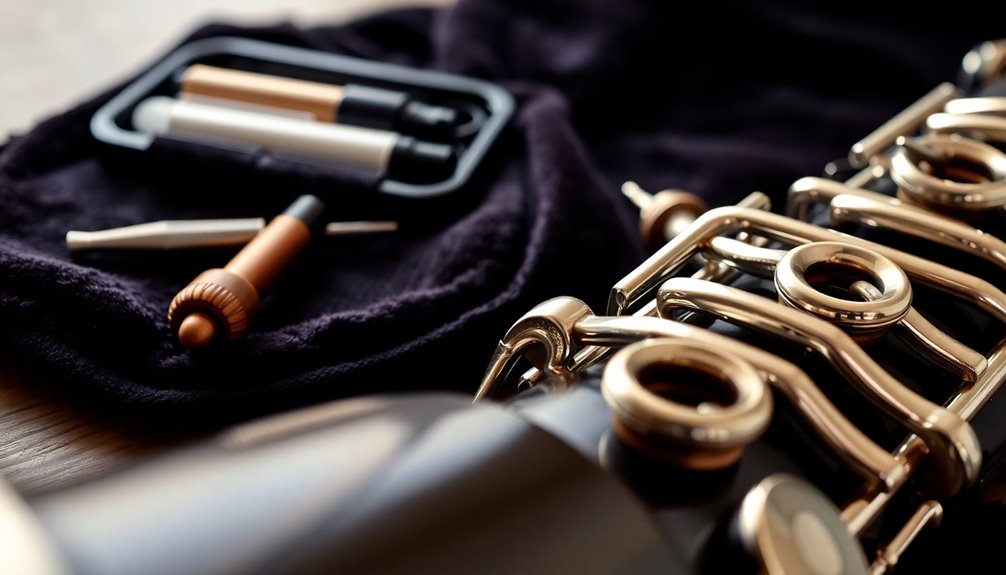
Regular cleaning routines help guarantee that all parts of your instrument function smoothly, which brings attention to the pads and corks.
These components are essential for guaranteeing airtight seals and peak sound quality. Inspecting them regularly can prevent unnecessary repairs and extend your instrument's lifespan.
When checking pads, look for signs of wear, such as discoloration or cracking. If you notice that a pad isn't sealing properly, you may need a pad replacement.
Verify that the pads sit evenly against the tone holes; any gaps can lead to leaks, affecting your instrument's performance. It's best to address these issues promptly.
Corks also play an important role. Check for any signs of fraying or hardening, as these can impact the fit of the joints.
Cork adjustment is significant; if a cork is too tight, it can cause damage when assembling or disassembling your instrument. Conversely, if it's too loose, it can lead to air leaks.
To maintain peak performance, keep a close eye on these components every few months, or more frequently if you play often. Additionally, using essential flute key oil can help lubricate the pads and corks, ensuring optimal function and longevity.
Don't hesitate to consult a professional if you're unsure about the condition of your pads or corks.
Remember, taking the time to inspect these elements not only enhances your instrument's playability but also fosters a deeper connection to your music.
Monitor Key Mechanisms
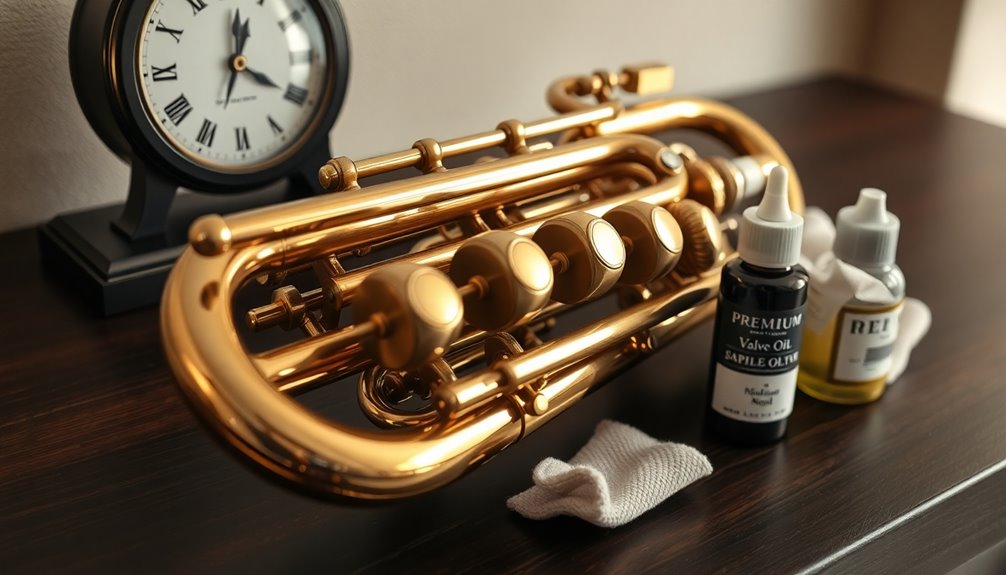
While playing your instrument, it is vital to monitor the key mechanisms for best performance. Proper key alignment and mechanism lubrication guarantee smooth operation and longevity of your instrument. Regularly checking these components can prevent unnecessary wear and enhance your playing experience. Additionally, incorporating a proper flute cleaning kit into your maintenance routine will further enhance your instrument's performance.
To help you stay organized, here's a simple table you can use to track your key mechanism maintenance:
| Check | Frequency | Notes |
|---|---|---|
| Key Alignment | Monthly | Look for gaps or misalignment. |
| Mechanism Lubrication | Every 3 months | Use appropriate lubricant sparingly. |
| Spring Tension | Biannually | Test responsiveness with finger pressure. |
| Screw Tightness | Annually | Tighten screws to avoid rattling. |
| General Inspection | Every practice session | Listen for any unusual sounds. |
Make it a habit to check key alignment regularly. Misaligned keys can hinder performance, causing frustration during practice or performances. Confirm the keys move freely without sticking, and adjust as necessary.
Additionally, mechanism lubrication is vital. Over time, oils can dry out, leading to sluggish key movement. Use a small amount of appropriate lubricant to keep everything functioning smoothly. This simple act can greatly improve your instrument's responsiveness.
Use Appropriate Cleaning Tools
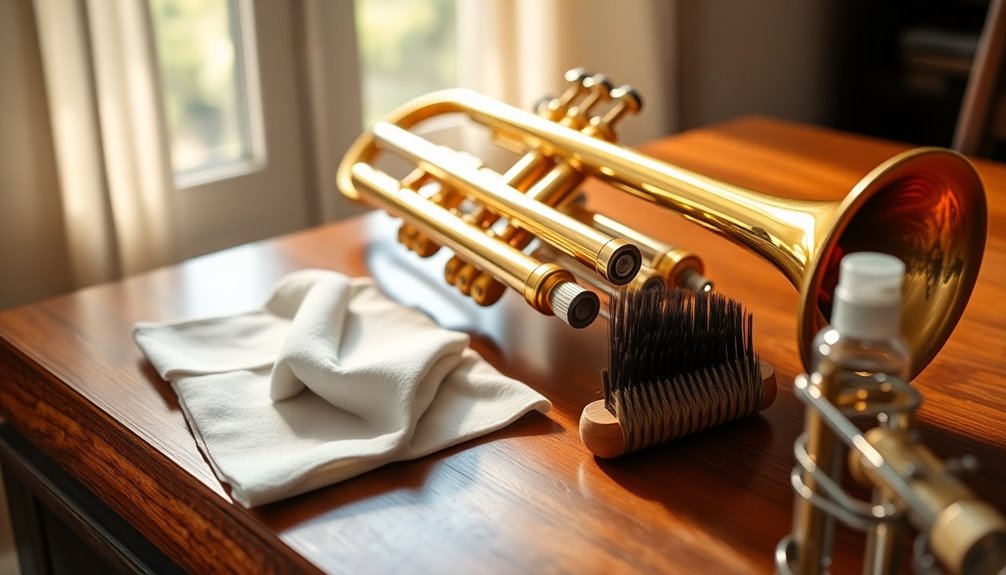
How can using the right cleaning tools enhance the longevity and performance of your instrument? By selecting appropriate cleaning tools and solutions, you're not just polishing your instrument; you're protecting its integrity. Using the wrong materials can lead to scratches, corrosion, or damage that can impair sound quality and overall functionality.
Start with a reliable maintenance kit specifically designed for your instrument. These kits often include essential tools like microfiber cloths, brushes, and swabs tailored to your instrument's unique requirements. For example, a flute maintenance kit typically contains a cleaning rod and cloth that effectively removes moisture without risking scratches. A comprehensive kit can include multiple cleaning tools that address various maintenance needs, ensuring your instrument receives thorough care.
When it comes to cleaning solutions, opt for those that are safe and non-abrasive. Avoid household cleaners that could leave residues or harm the finish. Instead, use specialized cleaning solutions recommended by manufacturers or trusted experts. These solutions guarantee that you're not just cleaning but also preserving the materials your instrument is made from.
Incorporating these tools and solutions into your maintenance routine isn't just about keeping your instrument looking good; it's about fostering a deeper connection with it. Regular cleaning with the right tools enhances airflow, prevents buildup, and guarantees that your instrument remains in peak condition.
Store Your Flute Properly

Maintaining your flute's condition extends beyond using the right cleaning tools; proper storage plays an important role in its longevity and performance. When you're not playing, how you store your flute can greatly impact its condition. Always use a high-quality flute case designed specifically for your instrument. A sturdy case protects against physical damage, while also preventing dust accumulation and potential moisture exposure.
Humidity control is vital for wood and metal flutes alike. Excess moisture can lead to corrosion, while too little can cause pads to dry out and become ineffective. Consider using a case with built-in humidity control features, such as a desiccant or hygrometer, to monitor and maintain ideal humidity levels. If your case lacks these features, placing a small humidity control pouch inside can help regulate moisture.
When storing your flute, make sure to disassemble it as per the manufacturer's guidelines. This practice not only prevents damage to delicate components but also allows for better air circulation within the case.
Avoid leaving your flute in environments with extreme temperature fluctuations, like cars or direct sunlight, as these conditions can warp or damage the instrument. Additionally, using a case made from high-quality materials ensures that your flute remains protected from potential environmental damage.
Lastly, keep your flute's case organized. Confirm that accessories, such as cleaning cloths and swabs, are stored neatly alongside your flute. This way, you're always prepared for a quick wipe-down or maintenance check before and after playing.
Schedule Professional Servicing
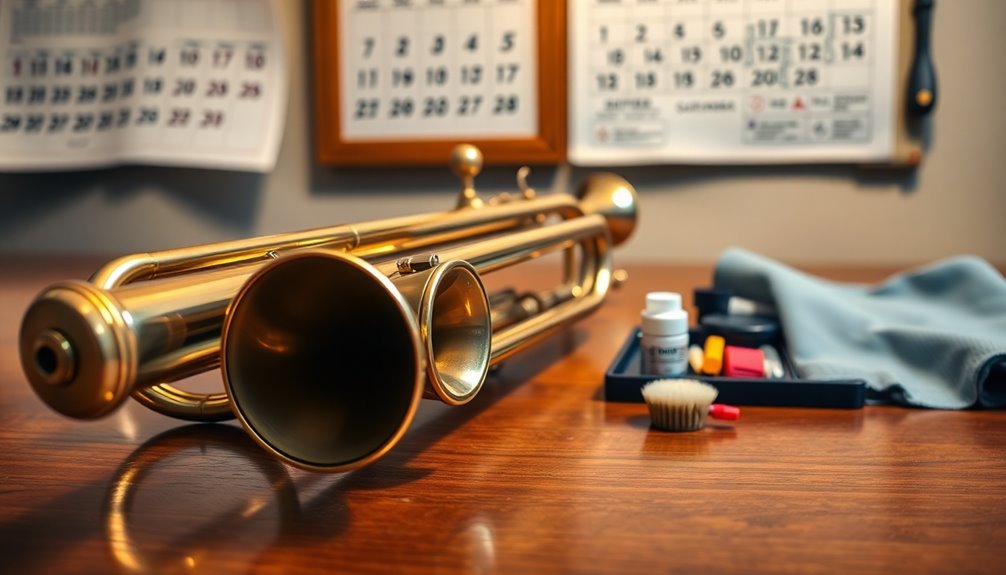
To guarantee your flute remains in peak playing condition, scheduling regular professional servicing is vital. A professional technician can identify and rectify potential issues that you might overlook during your routine checks. Typically, it's advisable to have your flute serviced at least once a year; however, if you play frequently or in varying environments, consider increasing the servicing frequency to every six months.
During a professional servicing, the technician will thoroughly inspect your instrument, addressing any wear on pads, springs, and corks. They'll also clean the flute, making sure that all the mechanisms function smoothly, which is essential for maintaining sound quality. Regular maintenance with a flute cleaning kit can also enhance your instrument's performance between professional check-ups.
If you notice any changes in the flute's response or sound, don't wait for your scheduled servicing; reach out to a technician sooner.
Building a relationship with a trusted professional technician not only guarantees your flute receives the best care but also connects you to a community of musicians who value quality.
You'll benefit from their expertise, gaining insights into your instrument's specific needs and how to optimize its performance.
Keep a Maintenance Log
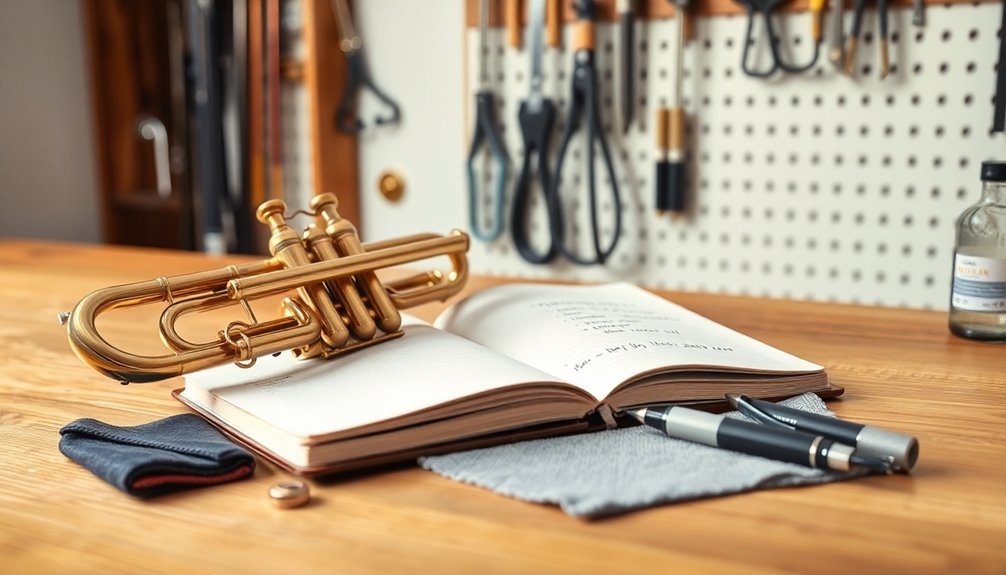
Alongside regular professional servicing, keeping a maintenance log can greatly enhance your flute's performance and longevity. A well-organized log allows you to track essential maintenance tasks, helping you stay on top of your instrument's care. Start by noting the date of each service appointment, along with any specific repairs or adjustments made. This practice not only provides a historical record but also helps you recognize patterns in your flute's needs.
In your log, include maintenance reminders such as pad replacements, spring adjustments, and cleaning schedules. Documenting these details guarantees you're aware of when to perform routine tasks and can help prevent more significant issues down the line. Consider incorporating a checklist format for easy reference; this will streamline log organization and make it simpler to track completed tasks.
You might also want to note the environmental conditions in which you play. Humidity, temperature, and even your playing frequency can impact your flute's maintenance needs. By maintaining this level of detail, you create a thorough overview that can guide your future care decisions. Additionally, regular inspections for signs of damage can help you address potential issues early before they require costly repairs.
Lastly, sharing your log with fellow musicians can foster a sense of community and belonging. You'll find that many players appreciate the insights gained from such documentation, and it can lead to valuable discussions about best practices in instrument care.
Frequently Asked Questions
How Often Should I Replace My Flute's Pads?
You should replace your flute's pads every 2 to 5 years, depending on their pad lifespan.
Factors like humidity, usage frequency, and playing style affect how long they last.
If you notice leaks, sticky keys, or unusual sounds, it's time for a pad replacement.
Regular checks can help maintain your flute's performance and guarantee you enjoy playing without interruptions.
Keep an eye on your pads to make certain they're in top condition.
Can I Use Household Cleaners on My Flute?
You shouldn't use household cleaners on your flute, as they can damage delicate parts.
Instead, consider household cleaner alternatives like a mixture of water and vinegar for safe cleaning.
Employ proper flute cleaning techniques by using a soft cloth to gently wipe down the exterior and a cleaning rod with a microfiber cloth for the inside.
This way, you'll maintain your instrument without risking harm, ensuring it stays in top condition for your music.
What Are the Signs My Flute Needs Professional Servicing?
If your flute sounds off, it might be time for professional servicing. Listen for unusual notes or lack of clarity; these can indicate issues.
Check the key alignment; misaligned keys can lead to poor sound quality and difficulty playing.
If you notice excessive moisture, sticky keys, or mechanical noises, don't ignore them. Addressing these signs early can prevent more significant problems, ensuring your instrument continues to play beautifully.
Is It Safe to Play My Flute in Humid Conditions?
Playing your flute in humid conditions can feel like dancing in a rainstorm—beautiful but risky.
High humidity can cause moisture to seep into your instrument, potentially damaging pads and causing corrosion. To protect your flute, consider the humidity effects on its materials.
If you must play, wipe it down frequently and store it in a case with desiccants.
Prioritizing flute care guarantees your instrument stays in top shape, ready for your next performance.
How Do I Choose a Qualified Technician for Servicing?
Choosing a qualified technician for servicing your flute involves evaluating their technique and qualifications.
Start by checking their experience with woodwinds and any certifications they hold. Ask about their approach to technique evaluation—how they diagnose issues and what methods they use for repairs.
Additionally, seek recommendations from fellow musicians to guarantee you're selecting someone trusted in the community.
A skilled technician can enhance your instrument's performance and longevity, making your investment worthwhile.
Conclusion
By following these maintenance tips, you'll keep your instrument in top shape, much like a well-tuned engine purring smoothly. Regular cleaning, inspections, and proper storage not only enhance performance but also extend your flute's lifespan. Don't forget to schedule professional servicing and maintain a log to track your efforts. With diligence and care, your instrument will continue to resonate beautifully, ensuring you enjoy making music for years to come.




